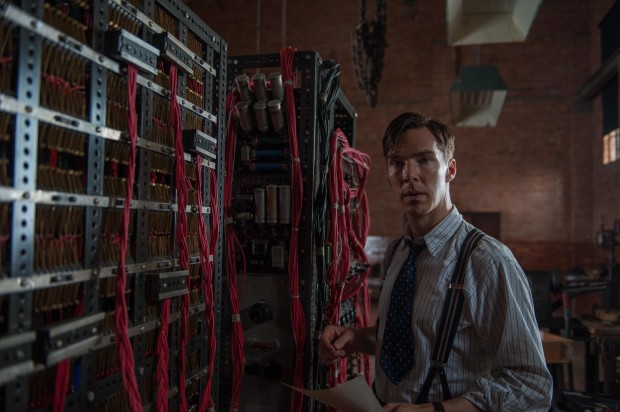You have no items in your cart. Want to get some nice things?
Go shopping
“This isn’t Sherlock in tweed fiddling around with valves and wires,” quips Cumberbatch after the London Film Festival press screening of The Imitation Game. Cumberbatch is of course keen to quash any reductionist comparison between the two men considering he is, at present, cornering the market in socially awkward geniuses. Although Turing is brilliant, “he does not swish about in a coat with curly hair letting everyone know how brilliant he is,” à la Sherlock. It is a quieter, more subtle intellectual we find in the long awaited Alan Turing biopic.
It’s a story that until recent years had been classified information, as well as shrouded in shame for the British government. Turing was the misanthropic genius who created a machine that was able to crack the unbreakable German Enigma code, thus significantly reducing the length of the Second World War, and in turn saving millions of lives. He was a pioneer and a war hero. He was also homosexual, and like many others of his time was severely persecuted by the British government because of it.
The Imitation Game is a perfectly lovely and captivating film. Yet, perhaps because of Turing’s cult status, director Morten Tyldem (Head Hunters) has played it safe. This well-assembled heritage drama feels more like a great BBC mini-series than the high stakes, earth-shattering Turing film that fans were hoping for. It’s hard to understand how and why the BAFTA-nominated Tyldem has produced a film so cinematically beige. Then again, plenty of people like beige.
Narratively the story is told in three different time strands: one follows Turing in the present as the police try to figure out who he is and instead uncover the secret of his sexuality; another follows Turing the school boy as he discovers his love of puzzles and, indeed, boys; the final strand shows Turing during the war as he ruffles feathers and cracks the code.
There are fine performances from the best and the brightest of British cinema. Kiera Knightley plays Joan Clarke, Turing’s fellow codebreaker and fiancée, with great sensitivity and depth, demonstrating that her abilities as an actress are significantly evolving. Mark Strong manages to steal all his scenes as a sociopathic MI6 agent. On the whole the performances are flawless if not riveting.
However, it is Tyldem’s handling of Turing’s homosexuality where The Imitation Game truly shines. Historical biopics that address LGBT can be a murky affair. Concentrate too much on the sexuality of the person and you do them a disservice: the complex character of any individual should never be reduced to mere sexuality. If a film omits or glosses over the matter of sexuality, then it can be accused of oppression by reinforcing gender norms. But Cumberbatch’s Turing speaks frankly of his homosexuality. Although society has forced him to conceal it, we never get the impression that it is something he is ashamed of. Indeed this is supported by biographical evidence. We know that Turning did not want to plead guilty to indecency because he did not feel guilty of any crime. He had admitted that he was a homosexual to a colleague and also to his fiancée Joan Clarke . All of this is done with frank discussion rather than stolen kisses behind windows. Although I am sure that hoards of Cumberbitches would not have minded that approach.
Some may find inconsistencies in the characterisation of Turing, perhaps alluding to speculation that he was aspergic . Both screenwriter Graeme Moore and Cumberbatch have been quick to dismiss this portrayal. Cumberbatch himself is keen to point out the dangers of historical diagnosis. Having said this, it is interesting that the film shows Turing as unable to answer the simple question, “Would you like a sandwich?” On the whole Cumberbatch has succeeded in creating a compelling and sympathetic Turing, while Graeme Moore’s adoring and erudite script throws some light on the scientific pioneer of profound hidden strength and talent, which put in the hands of accomplished actors makes for a delightful film, though sadly not one as groundbreaking as its subject.
The Imitation Game is in UK cinemas now.

About Amy Howerska
Amy Howerska is an award winning stand up comedian and comedy writer. She is currently writing and appearing as a panellist on the new series of What’s The Story for BBC Radio Wales and her recent TV credits include The 50 Funniest Moments of 2012 (Channel 4) and Richard Hammond’s Secret Service (BBC1). Prior to her career in comedy Amy worked in the film industry for several years, most notably at the British Film Institute where she worked closely with iconic figures from the film world. Prior to this Amy was the test group for the first ever film module offered at Oxford University, she specializes in radical reinterpretations of heritage Cinema.




